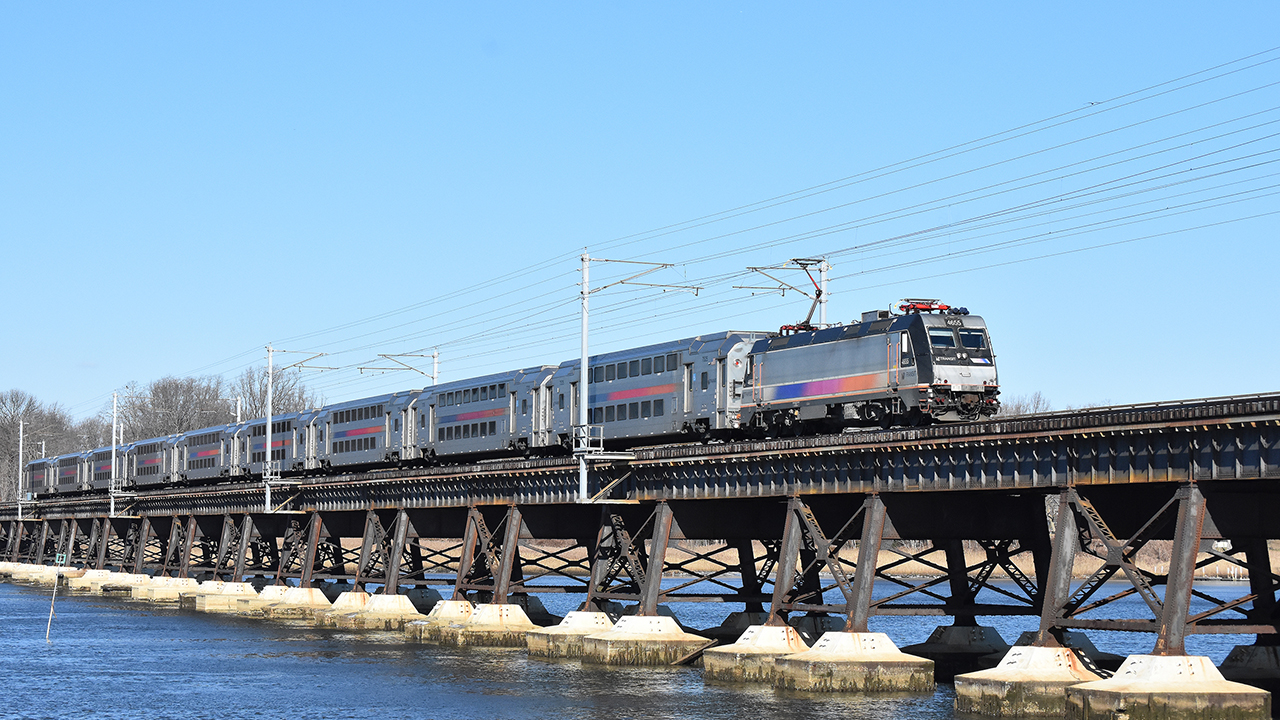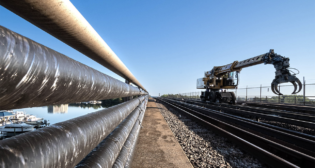
NJT Sets FY24 Ops, Capex Budgets
Written by William C. Vantuono, Editor-in-Chief
Westbound NJT North Jersey Coast Line train 3231—nine MultiLevels hauled by an ALP46 electric—crosses the Navesink River Bridge, prior to stopping at Red Bank station. William C. Vantuono photo.
New Jersey Transit has set its Fiscal Year 2024 operating and capital funding budgets, which the agency said “continue investments in personnel, infrastructure and equipment to maintain the system in a state-of-good-repair and enhance the overall customer experience.”
NJT adopted a $2.86 billion operating budget, 27% of whose revenue comes from passenger fares. The remaining amount comes from dedicated funding from the New Jersey Turnpike Authority, which is $440 million in FY24, in addition to federal COVID-19 relief money, and a combination of commercial revenue and state and federal resources. Approximately 60% of the operating budget is dedicated to costs associated with labor and fringe benefits. Expenses including materials, fuel and power, utilities, and outside services represent 31% of the total. Purchased transportation represents the remaining 9%. The operating budget does not include a fare increase.
NJT’s Capital Funding Appropriation totals $1.733 billion “and represents an expected funding source that will provide, along with other past and future annual appropriations, the funds needed to execute the funded portion of investments in the FY2021-FY2025 Capital Plan,” the agency said. It is funded from several sources: $796.4 million from the Federal Transit Administration (FTA), $34.8 million from the federal All Stations Accessibility Program (ASAP), $75 million in flexed funds from the Federal Highway Administration (FHWA) provided through the New Jersey Department of Transportation (DOT), $760 million from the New Jersey Transportation Trust Fund (TTF), and $66.5 million of Casino Revenue, Local Match, and Turnpike Authority funds.
“Our Five-Year Capital Plan continues to prioritize investments in infrastructure to maintain an overall state-of-good-repair and enhance reliability, safety and resiliency as well as improve the overall customer experience on the system,” NJT noted, adding that the plan is “an unconstrained vision of projects to demonstrate opportunities for safety, service, reliability, resiliency, sustainability and other critical improvements.” The Five-Year Capital Plan contains projects “already funded by existing or expected resources, and proposed projects for which funding has yet to be identified but is vital to NJT’s service delivery.”

“Through the operating budget and capital funding, NJT will ensure the continued safety and reliability of our system, deliver a high-quality experience for our customers, and improve our overall service, without imposing any fare increases,” said President and CEO Kevin S. Corbett. “We are especially proud of our continued collaboration with all 21 New Jersey counties to fund community transportation programs, a critical part of meeting the mobility needs of New Jerseyans who depend on public transportation.”
NJT said it partners with all 21 New Jersey counties to fund community transportation programs, which “assist a variety of private non-profit organizations, counties, municipalities, county improvement authorities, and NJT in meeting the mobility needs of New Jerseyans who depend on public transportation.” These programs include:
- $38.9 million from the New Jersey Casino Revenue Fund to operate the statewide Senior Citizen and Disabled Resident Transportation Assistance Program, or SCDRTAP.
- $13.8 million for Federal Transit Administration (FTA) Section 5310 “Enhanced Mobility of Seniors and Individuals with Disabilities” programs, which provide federal funds for operating expenses as well as the purchase of vehicles and related equipment by private, non-profit agencies, and designated public entities. This includes $2.7 million in state funding to support local matching fund requirements.
- $6.2 million for FTA Section 5311 “Formula Grants for Rural Areas” programs, which provide federal funds for capital, administrative, and operating assistance for public transportation services in and between small urban and rural areas of New Jersey. This includes $2 million in state funding to support local matching fund requirements.
- $155,540 in federal funding for the FTA Section 5311(b)(3) Rural Transit Assistance Program, which provides training and technical assistance for small transit operators receiving funding through NJ TRANSIT’s Local Programs.
- $843,962 for FTA Section 5311 Rural Intercity Bus Transportation Program
- $5.5 million for the New Jersey Jobs Access and Reverse Commute (NJ-JARC) Program under which counties and localities provide public transportation services to help residents obtain community transportation to employment opportunities.
- $6 million in other funds passed through to sub-recipients.



